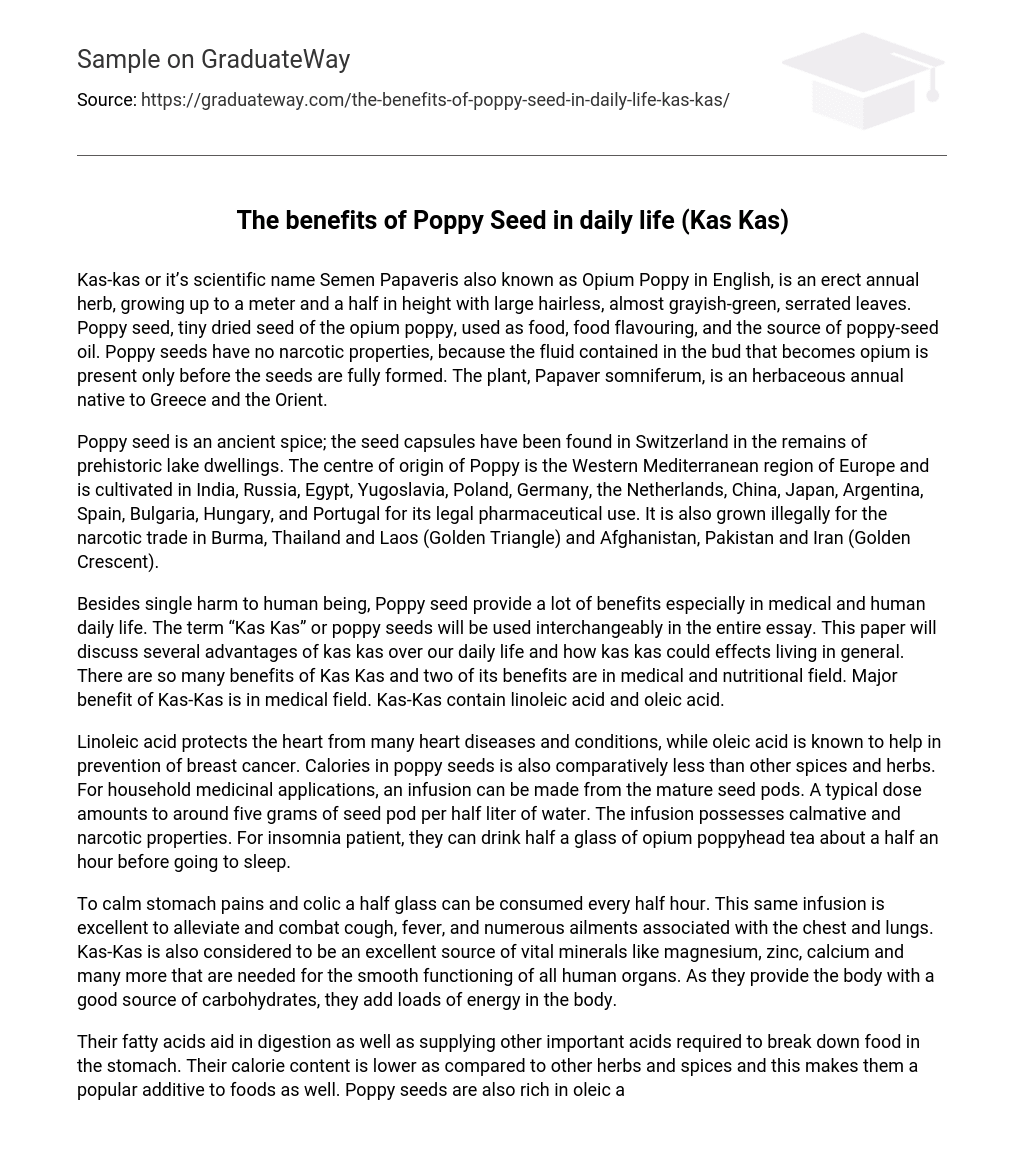Kas-kas, also known as Opium Poppy in English and scientifically named Semen Papaveris, is a tall annual herb with hairless, almost grayish-green, serrated leaves, growing up to a meter and a half in height. Poppy seed refers to the tiny dried seed of the opium poppy and is used as food, food flavouring, and the source of poppy-seed oil. It is important to note that poppy seeds do not possess any narcotic properties as the fluid that eventually becomes opium is only present before the seeds are fully formed. The plant, Papaver somniferum, is a herbaceous annual native to Greece and the Orient.
Poppy seed, an ancient spice, has been discovered in the remains of prehistoric lake dwellings in Switzerland. It originated in the Western Mediterranean region of Europe and is currently cultivated in various countries including India, Russia, Egypt, Yugoslavia, Poland, Germany, the Netherlands, China, Japan, Argentina, Spain, Bulgaria, Hungary, and Portugal. These regions primarily grow poppy for its legal pharmaceutical purposes. However, illegal cultivation for the narcotic trade can be found in Burma, Thailand, Laos (Golden Triangle), as well as Afghanistan, Pakistan, and Iran (Golden Crescent).
Poppy seeds, also known as “Kas Kas,” have both potential harm and numerous benefits for humans. This essay explores the positive impact of poppy seeds on our well-being, focusing on their medical and nutritional advantages. One significant benefit lies in their high content of linoleic acid and oleic acid, making them highly beneficial for medical applications.
Linoleic acid is advantageous for cardiovascular health, safeguarding against different heart ailments and conditions. Furthermore, oleic acid assists in the prevention of breast cancer. Poppy seeds have lower calorie content compared to other spices and herbs. To harness their medicinal properties for household uses, one can prepare an infusion using mature seed pods. The suggested quantity is around five grams of seed pod per half liter of water. This infusion possesses soothing and narcotic properties. People with insomnia can consume approximately half a glass of opium poppyhead tea about thirty minutes prior to going to bed.
Consuming a half glass of Kas-Kas infusion every thirty minutes is suggested to alleviate stomach pains and colic. This infusion also benefits in relieving coughs, fevers, and various chest and lung-related ailments. Additionally, Kas-Kas contains important minerals like magnesium, zinc, calcium, and others that are necessary for the optimal functioning of all organs in the human body. Furthermore, Kas-Kas provides a significant amount of carbohydrates that help boost energy levels.
Poppy seeds offer several benefits. They contain fatty acids that aid in digestion and provide essential acids for breaking down food in the stomach. Additionally, they have a lower calorie content compared to other herbs and spices, making them popular as an addition to foods. Poppy seeds are also rich in oleic acid, which is believed to have preventive effects against breast cancer, and they contain approximately 45-50% unsaturated fatty acids.
To summarize their nutritional value, one tablespoon of poppy seeds (approximately 9g) contains 45.9 Calories, 126 mg Calcium, 1mg Protein, 62.9 mg Potassium, 30.4 mg Magnesium, 76.1 mg Phosphorous, 2.3 mg Sodium, and 2.5 g Carbohydrates.
In addition to their nutritional benefits, poppy seeds have a sweet nutty flavor and are commonly used as flavorings in breads, rolls, and cakes. They can also be used to create poppy seed oil which has applications in cooking artist’s colors and soap production. Pressed seed cakes are even utilized as livestock feed. In Malaysia, poppy seeds find their use in local Indian cuisine like Nasi Kandar.





